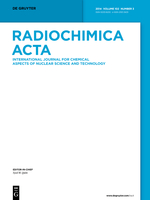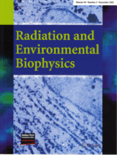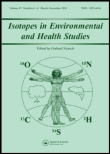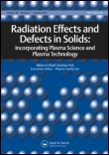
RADIOCHIMICA ACTA
Scope & Guideline
Unveiling the Complexities of Radioactivity in Chemical Contexts
Introduction
Aims and Scopes
- Radiochemical separations and extraction techniques:
The journal emphasizes studies on the separation and extraction of radionuclides using innovative methodologies, including solvent extraction, ion exchange, and adsorption techniques. These studies are crucial for nuclear waste management and resource recovery. - Synthesis and characterization of radiopharmaceuticals:
Research articles often focus on the development of new radiopharmaceuticals for medical applications, including cancer diagnosis and treatment. This includes the synthesis of radiolabeled compounds and their evaluation in preclinical studies. - Environmental radiochemistry:
The journal publishes studies that assess the levels and impacts of natural and anthropogenic radioactivity in various environmental matrices, contributing to our understanding of environmental health and safety. - Radiation shielding and dosimetry:
Papers frequently explore materials and methods for radiation shielding, as well as dosimetric studies to monitor and mitigate radiation exposure in various settings. - Theoretical modeling and computational studies:
The journal features articles that apply theoretical models and computational techniques to understand radiochemical processes, enhancing the predictive capabilities in radiochemistry.
Trending and Emerging
- Nanotechnology in radiochemistry:
There is a growing trend in the application of nanotechnology for the development of advanced materials and methods for radiochemical applications, particularly in the synthesis of nanocomposites for enhanced adsorption and detection of radionuclides. - Radiopharmaceutical development for targeted therapy:
Increased attention is being given to the development of targeted radiopharmaceuticals, particularly for cancer treatment, showcasing a shift towards personalized medicine in nuclear medicine. - Green chemistry approaches:
Emerging research emphasizes sustainable practices in radiochemistry, such as the use of eco-friendly solvents and materials for radionuclide extraction and separation, reflecting a broader trend towards sustainability in scientific research. - Advanced computational modeling:
There is a significant increase in the use of advanced computational techniques and modeling approaches to simulate radiochemical processes, enhancing the understanding of reaction mechanisms and improving the design of experiments. - Environmental monitoring and remediation:
An emerging focus on environmental applications highlights the importance of monitoring radioactive contaminants and developing remediation strategies, underscoring the societal relevance of radiochemistry in addressing environmental issues.
Declining or Waning
- Traditional nuclear chemistry:
There has been a noticeable decrease in publications focusing solely on traditional nuclear chemistry topics, such as basic studies of nuclear reactions without direct applications to modern challenges or technologies. - Basic studies in radiobiology:
Research articles dedicated to fundamental aspects of radiobiology, particularly those not linked to practical applications or advancements in therapeutic techniques, have become less frequent. - Historical reviews of radiochemistry:
There is a declining trend in the publication of extensive review articles that focus on historical perspectives in radiochemistry, as the field shifts towards more cutting-edge research and applications. - Conventional analytical methods:
Papers that solely discuss conventional analytical methods without novel enhancements or applications in radiochemistry are appearing less frequently, as the field moves towards more innovative and interdisciplinary approaches. - Sorption studies in non-radiochemical contexts:
Research focusing on sorption studies that do not explicitly relate to radionuclides or radiochemical processes is becoming less prominent, as the journal prioritizes topics that align closely with its core aims.
Similar Journals

RADIOCHEMISTRY
Unveiling the Mysteries of Isotopes and Their ImpactRADIOCHEMISTRY, published by PLEIADES PUBLISHING INC, is a prominent journal focusing on the dynamic field of radiochemistry, encompassing both theoretical and experimental research in the application of radioactive elements and isotopes across various scientific domains. With the ISSN 1066-3622 and e-ISSN 1608-3288, this journal has been a vital resource for scholars since its inception, converging years of valuable research from 2003 to 2024. The journal currently holds a Q4 category quartile in the Physical and Theoretical Chemistry field, reflecting its niche position within this specialized discipline. Despite ranking #156 out of 189 in Scopus for Chemistry Physical and Theoretical Chemistry, with a 17th percentile ranking, RADIOCHEMISTRY continues to serve as an important forum for advancing knowledge and fostering collaboration among researchers and professionals dedicated to the study of radiochemical processes. Although it does not offer Open Access, researchers are encouraged to delve into its rich content for insights and advancements in radiochemistry.

RADIATION AND ENVIRONMENTAL BIOPHYSICS
Illuminating the Impact of Radiation on Biological SystemsRADIATION AND ENVIRONMENTAL BIOPHYSICS, published by SPRINGER, is a premier journal dedicated to advancing the understanding of the interactions between radiation and biological systems within environmental contexts. With an ISSN of 0301-634X and an E-ISSN of 1432-2099, this journal has established itself as a vital source of innovative research across multiple disciplines, including Biophysics, Environmental Science, and Radiation Studies, maintaining a significant presence since its inception in 1974. The journal is categorized within the Q3 in Biophysics and Q2 in both Environmental Science and Radiation for 2023, indicating its relevance and influence in these domains. Researchers and professionals will find the journal's rich content invaluable, offering insights that could impact public health, environmental policy, and radiation safety. Although it is not an open-access journal, RADIATION AND ENVIRONMENTAL BIOPHYSICS provides critical information through its rigorous peer-reviewed articles, making it an essential resource for academics and practitioners aiming to contribute to this evolving field.

ISOTOPES IN ENVIRONMENTAL AND HEALTH STUDIES
Bridging Isotopes and Sustainability in Health StudiesISOTOPES IN ENVIRONMENTAL AND HEALTH STUDIES is a pivotal journal published by Taylor & Francis Ltd, focused on disseminating cutting-edge research within the fields of environmental science and health. With an established history since its inception in 1995 and a convergence period extending to 2024, the journal plays a significant role in advancing the understanding of isotopic applications in environmental and health-related studies. Currently classified within the Q3 category in Environmental Chemistry and Q2 in both Environmental Science (miscellaneous) and Inorganic Chemistry, it ranks favorably among its peers, holding a position that highlights its academic relevance and impact. Although the journal does not operate on an open access model, it remains a crucial resource for researchers and professionals seeking in-depth analysis and findings that underpin the relationship between isotopes and environmental processes. Its contributions cater to a diverse audience keen on exploring innovative methodologies and interdisciplinary approaches that foster sustainability and public health.

Radiation Effects and Defects in Solids
Transforming Understanding of Solid Material Behavior Under RadiationRadiation Effects and Defects in Solids is a prestigious academic journal published by TAYLOR & FRANCIS LTD that has been at the forefront of research related to the impacts of radiation on various solid materials since its inception in 1989. With an ISSN of 1042-0150 and an E-ISSN of 1029-4953, this journal serves as an essential resource for researchers and professionals in the fields of Condensed Matter Physics, Materials Science, and Nuclear and High Energy Physics. Despite its current categorization in the Q4 quartile across these disciplines, Radiation Effects and Defects in Solids remains critical for advancing knowledge of material responses to radiation, which is vital for applications in nuclear energy, space exploration, and radiation therapy. The journal publishes original research articles, reviews, and letters that provide insights into material properties, radiation dosimetry, and defect structures, fostering collaboration and innovation within the scientific community. As the field evolves, Radiation Effects and Defects in Solids continues to play a significant role in disseminating valuable research findings and keeping pace with emerging trends in materials science and radiation physics.

Izvestiya Vuzov-Prikladnaya Khimiya i Biotekhnologiya
Transforming Ideas into Practical ApplicationsIzvestiya Vuzov-Prikladnaya Khimiya i Biotekhnologiya, published by Irkutsk National Research Technical University, is a prominent open-access journal dedicated to advancing the fields of applied chemistry and biotechnology. Since its inception in 2011, this journal has provided a platform for the dissemination of significant research findings, innovative techniques, and technological advancements that bridge the gap between theoretical frameworks and practical applications. The journal is indexed in various databases, ensuring that published works reach a global audience of researchers, professionals, and students eager to explore the latest developments in these critical disciplines. With its commitment to open-access publishing, Izvestiya Vuzov-Prikladnaya Khimiya i Biotekhnologiya plays a vital role in fostering collaboration and knowledge sharing within the scientific community, thus contributing to the advancement of both fields in a rapidly evolving technological landscape.

JOURNAL OF ENVIRONMENTAL RADIOACTIVITY
Pioneering insights into radioactive contamination and health.JOURNAL OF ENVIRONMENTAL RADIOACTIVITY, published by Elsevier Science Ltd, is a prestigious peer-reviewed journal dedicated to the field of environmental science with a particular focus on the implications and management of radioactivity in the environment. Since its inception in 1984, the journal has served as a vital platform for researchers, scientists, and professionals to disseminate new findings that intersect with areas such as environmental chemistry, health, toxicology, pollution, and waste management. With a strong reputation reflected in its 2023 Q2 rankings across multiple categories and respectable Scopus rankings, it offers valuable insights and rigorous research that shape the discourse on environmental safety and public health. Although it does not operate under an open-access model, subscribers benefit from high-impact articles that push forward the boundaries of knowledge in the management and understanding of radioactive contaminants. This journal is essential for anyone involved in environmental research or policy-making who seeks to stay informed about the latest developments in this critical area of study.

Problems of Atomic Science and Technology
Elevating Standards in Atomic Science Research.Problems of Atomic Science and Technology is a leading journal in the realm of nuclear physics and technology, published by the esteemed Kharkov Institute of Physics and Technology. With an ISSN of 1562-6016, this journal is dedicated to disseminating high-quality research and advancements in atomic sciences, contributing significantly to both academic and practical applications in the field. Although not an open access publication, it ensures rigorous peer review standards to maintain the integrity and relevance of cited works. The journal seeks to provide a vital platform for researchers, professionals, and students who are engaged in the exploration of atomic phenomena, nuclear engineering, and associated technologies. Published from Kharkov, Ukraine, the journal also serves as a bridge for international collaboration and innovation, making it indispensable for anyone looking to stay at the forefront of atomic science research.

NUCLEAR MEDICINE REVIEW
Empowering Professionals with Cutting-Edge FindingsNUCLEAR MEDICINE REVIEW is a distinguished journal in the field of radiology, nuclear medicine, and imaging, published by VIA MEDICA in Poland. Since its transition to an open access format in 1999, this journal has been dedicated to promoting the dissemination of knowledge and research findings across a global audience. With a focus on innovative approaches and advancements in nuclear medicine, it aims to serve as a key resource for researchers, professionals, and students who are working to further the understanding of nuclear imaging and its applications. In 2023, the journal was classified in the Q3 category within Radiology, Nuclear Medicine and Imaging, and Q4 in the broader category of Medicine (miscellaneous), highlighting its growing reputation in the academic community. As of the latest assessments, the journal has been ranked #235 out of 333 in its field according to Scopus metrics, reflecting its commitment to excellence and the relevance of its published works. The NUCLEAR MEDICINE REVIEW is a pivotal platform for those engaged in cutting-edge research, providing insights that drive the evolution of medical imaging and therapeutic techniques.

Nuclear Physics and Atomic Energy
Advancing knowledge in nuclear physics and energy.Nuclear Physics and Atomic Energy is a reputable open-access journal that focuses on the fields of nuclear physics and high-energy physics, providing a forum for researchers, professionals, and students to share their findings and advancements. Published by the Institute of Nuclear Research, National Academy of Sciences of Ukraine, this journal has been committed to disseminating knowledge since its inception in 2006, ensuring that scientific advancements remain accessible to a global audience. With an ISSN of 1818-331X and an E-ISSN of 2074-0565, the journal features a diverse array of articles that span the continued exploration and application of nuclear phenomena. Although currently categorized in the Q4 quartile for Nuclear and High Energy Physics in 2023, the journal is steadily working towards increasing its impact and engagement within the academic community. With a Scopus rank of #74 out of 87 in its category, it serves as a valuable resource for advancing crucial research in a vital scientific area. Researchers are encouraged to contribute their innovative studies to foster collaboration and knowledge sharing in this dynamic field.

INDIAN JOURNAL OF CHEMICAL TECHNOLOGY
Advancing Innovation in Chemical TechnologyThe Indian Journal of Chemical Technology, published by the Natl Inst Science Communication-NISCAIR, is a pivotal platform for the dissemination of innovative research in the field of chemical technology. With an ISSN of 0971-457X and an E-ISSN of 0975-0991, this journal has been serving the academic community since its inception in 1994, and is set to continue through 2024. The journal holds a Q4 ranking in both the Chemical Engineering and Chemistry categories as of 2023, though it showcases a significant breadth of research, making it a valuable resource for both emerging and established scholars. Although it currently operates without an open-access model, the journal aims to facilitate knowledge exchange through rigorous peer-reviewed publications, allowing researchers and professionals to stay updated with the latest advancements and practices in chemical technology. Located in New Delhi, India, the journal not only contributes to national scientific dialogue but also plays a key role in the global conversation around chemical sciences by addressing unique challenges and innovations pertinent to the region.